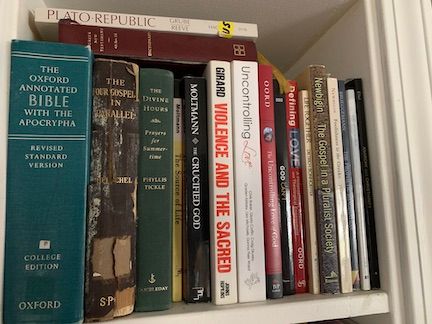Last month, my post Embracing Your Other explored a fundamental dysfunction that is as ancient as human experience, namely our inability to accept those with whom we disagree. All of humanity is enticed by the lure of xenophobia binding us together in solidarity through our primal fear of the other.
The Church
The Church isn’t a building; it is a collective of like-minded individuals, bound in their commitment to Jesus, the Christ. This means that Christians are not immune to the discomfort and fear felt when in the presence of difference. In fact, often times our religious commitments only serve to intensify our fears. Liberal and conservative alike, we must keep our xenophobic tendencies in check, lest they consume us.
René Girard
René Girard, in his book Violence and the Sacred, offers an in-depth survey of Greek mythology. During his study of ancient civilizations, Girard uncovered a primitive understanding of violence that was almost universally accepted in the ancient world. According to Girard, the primary way ancient civilizations kept communal aggression at bay was through ritual killings, thereby, diverting anxiety away from unfettered acts of violence toward a more focused and “useful” form of violence.
The process required the selection of a victim to suffer the wrath of the community. Collective aggression was then poured out on the victim, who paid the ultimate price for the community (a.k.a. scapegoating). Through the act of scapegoating the community dodged personal responsibility, and avoided collective self-reflection by demanding the life of the other.
Perhaps a more interesting point comes when Girard concludes the scapegoating mechanism was enacted almost universally, except for the Judeo-Christian tradition. Girard claims, that while virtually all ancient literature supported the practice of scapegoating, the Gospels are the only ancient texts that expose the scapegoating mechanism and offer a counter-narrative [1].
In the Gospel narratives Jesus is crucified for his disruption of the status quo. He challenged current trends and proclaimed the advent of the Kingdom of Heaven. It goes without saying, Jesus made a lot of people feel really uncomfortable. Firmly rooted within the Judeo-Christian tradition, Jesus was part of the Jewish community. Firmly rooted in the prophetic tradition, Jesus was also the community’s other.
Jesus’ death was a direct result of the social anxiety that emerged in the wake of his ministry. Jesus became the scapegoat, which was needed to bring order back to the life of the community. Jesus’ crucifixion stands as a reminder of what humanity is capable of when driven by our fears – we kill God.
If this was the end of the story, we would be screwed, but the Good News is that death doesn’t have the last word. Resurrection power is surging through this world. The resurrection of Jesus is God’s decisive act of vindication for the innocent scapegoat. Through the cross and resurrection God exposes and denounces the scapegoating mechanism, calling us to reflect on our personal contributions to the destruction of our other.
Mastering Xenophobia
Comparing Girard’s scapegoating mechanism with the crucifixion provides us with a framework for helping us better understand our human nature and a possible way forward.
Humanity is diverse. Our differences run the spectrum of age, culture, race, gender, sexuality, religion, and politics. These differences can either be our greatest resource of wisdom and understanding or they can consume us and become our undoing.
Humanity’s most primal instincts, like fear, are not necessarily the problem. These gifts help us negotiate relationships in a world shaped by agents of free-will. When we find ourselves in dire circumstances, our fight or flight response is triggered. The problem arises when we believe that these binary choices (fighting or running) are our only options. While there are times for fighting and running, there are also times when we must sit, listen and engage the knowledge and wisdom that is set before us in our other.
Only those who have the courage to suspend their discomfort long enough to self-reflect and disentangle their fear from the presence of their other, will see that there is a third way. We don’t always need to fight or run, we can also choose to embrace our discomfort and explore it. It takes a stronger, more mature individual to extend compassion and openness to our other, whom by the way, is just as uncomfortable with the experience as you.
Perhaps this is what Jesus meant when he admonished his disciples to take up their crosses and follow him (Matthew 16:22). Maybe the healing of the world will only come when our false-self is put to death. Maybe then we will truly be free enough to let go of our fears and to open ourselves up to the experience of our other.
Until next time.
Grace and Peace,
Bryan
[1] René Girard, “Are the Gospels Mythical?” First Things 62 (1996): 27.



